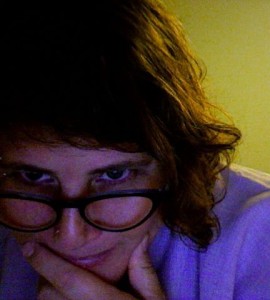Monica Meneghetti
Vancouver wears its October sky like a toque. I long to pull off that sodden wool to reveal the cascading golden curls I know are itching underneath. Back home in Banff, the first skiffs of snow are melting under blue sky while yellow leaves still cling to aspen and poplar. Here, fallen leaves transform the sidewalk into a blood red carpet or the scaly, brown back of a dragon. Rain soaks decaying leaves until they go limp and clump slimily against the pavement like misplaced kelp.
A weathered sandwich board on the sidewalk marks the entrance to SameSun Backpackers on Granville Street. I ease through a gaggle of twentysomething smokers to get to the glass entry door. The lobby looks and sounds like a nightclub entrance. Hardwood flooring extends past the front desk and into the pub, where another sandwich board welcomes guests to “The Beaver.” Am I the only new arrival who’s crude-minded enough to find the double entendre? Wisps of the front desk agent’s hair escape from her cap and a ten-gauge ring hangs from her septum. I check her out while she checks me in. The queer scene back home leaves a lot to be desired and I only have so many Air Miles. I have to be efficient.
The dormitory doors are painted as flags. Mine’s the Ethiopian one. Good thing I’m not Eritrean, I think, then claim the last bed, a top bunk. I don’t want to disturb my bunkmate later on, so I stash both my alarm clock and earplugs inside the pillowcase where I can easily find them in the dark.
I get myself to West Broadway to meet Betty for sushi before the Drag King Extravaganza. The sushi I can get back home. As for gender-bending, there’s only Cupcake John. The Banff Crag and Canyon once ran a photo of him in full drag, holding a tray of his renowned dessert. But most queer Banffites rely on varying degrees of camouflage like other wildlife. It’s the same in small towns all over Canada. We are the hinterqueers, carving out our lives far away from urban gay meccas, without benefit of rainbows or parades.
When I actually have to read menus, I’m definitely away from home. In Banff, I order from memory or simply find my spicy tuna cone in front of me before I even sit down. But the menu at Excellent Sushi Japan has multiple pages and the raw fish comes with clever names. Betty orders the “Tataki Attack.” Bewildered by the selection available, I rely on the server-recommended “X-rated Roll.” I feel uncool, slightly embarrassed by my lack of metro savvy.
“The trick,” Betty says, “is to decide what you’re in the mood for first, then scan for something on the menu that matches.”
“It’s just the opposite in Banff. There, I have to start with what’s available and hope I’m in the mood for it.”
I pour hot sake into Betty’s cup and congratulate her on finishing her PhD. She tips her head in thanks and shakes blond curls away from her face. Suddenly, I’m lost in the memory of those same curls escaping from the leather-gloved fist of a prison warden. Our only crime had been to venture behind bars on the dungeon floor at a women’s bathhouse in Toronto.
“I hope those new letters after your name still leave room for a few others, namely B, D, S, and M?”
Betty laughs. “Of course.”
Unsure how to follow up, I focus intently on stirring soya sauce into wasabi with the tips of my chopsticks.
◊ ◊ ◊
The streetlights of West Broadway reflect off wet, black pavement. A crowd of women has gathered in front of the Hollywood Theatre. Some are lipsticked and others bearded; some are holding hands, others kissing. Grrls smoke, bury hands in trouser pockets, clutch purses, arrange their hair. A transitioning female-to-male transgender opens the door for me. I admire how he endures acne and sparse facial hair with such dignity.
Inside the theatre, the mood of the crowd is at a level rarely achieved at the end of straight performances, much less at the beginning. Everyone’s talking and laughing and flirting, greeting each other with hugs and kisses and exclamations. Here, we drop the subtle guards required outside our community. I have rarely seen queer women fearlessly take up so much space. The place is buzzing with the release of suppressed energy.
And me? I’m like a long-sequestered pet that finally gets to go for a w-a-l-k. My face is overtaken by what I fear is an overly thrilled expression. Being a hinterqueer, it doesn’t take much to excite me. Just being among this many of my kind at once is worth the airfare. That grin keeps hold of my face for hours, through the drag king who sings to his femme hand puppet, through the bearded woman on stilts, through the androgynous German rock star, through the striptease, through the genderfuck and the burlesque and the lip-sync.
After the show, Betty introduces me to a petite woman with a spiky brush cut who adjusts her Windsor knot and buttons her suit jacket as I approach.
“Monica, this is Ray,” Betty says and apologizes for holding us up.
“It’s my fault,” says Ray in a high voice that doesn’t match her clothing.
“Well, punishment is required, then!” I tease, launching the three of us into a flirtation involving lollipop sucking and plenty of innuendo. Several times, I use the wrong pronoun and Ray corrects me: “he,” not “she.” I finally realize this person is not a butch woman but a transgender man.
“Wanna see my G-spot?” he asks, removing his shoe.
“Is there a new G-spot we haven’t heard about yet in Banff?”
He lifts the shoe to my eye level and removes the riser to show me the black and white label on the insole, which reads “G-Spot.” This he peels back to reveal a rectangular hole leading into the platform sole.
“What’s in there?” I ask, trying to peer inside.
“We don’t know each other well enough yet.”
We’re only half a block away from the theatre when Betty’s cell phone vibrates with Ray’s text message. I want to reply. It’s the first text I’ve ever typed. Betty instructs me while she drives. I lose three painstakingly punched drafts before I manage to send three suggestive words.
“Make sure you sign it,” Betty says, “so he knows it’s not from me.”
So. Our three-way flirtation ends here. I try not to show my disappointment in Betty’s lack of interest. Even my hope for a one-on-one dies as the cell phone remains perfectly still and silent in my lap.
◊ ◊ ◊
When I get back to my room, I find my pillow stripped of its case. There’s no sign of the earplugs or alarm clock I’d hidden inside.
I wake the Aussie in the bunk below mine. She lifts her pink satin sleep mask.
“Sorry! I didn’t think anyone had that bed so I took the pillowcase to wash my nylons in,” she explains, handing me my alarm clock.
I follow her down the hall to the laundry room. She opens the dryer, unzips my pillowcase. In plunges her flannel-clad arm and out come my orange foam earplugs. Their small bag is full of sudsy water, where they bob like two fat grannies in loud bathing caps. I squeeze and roll them in paper towel. But they still slide out of my ear canals repeatedly during the night, leaving me vulnerable to laughter and thudding from the Beaver.
◊ ◊ ◊
The next morning, ragged from lack of sleep, I begin to explore the city.
Might as well start with Yaletown since it is only a few blocks’ walk from the SameSun. The leaf motifs etched into Helmcken Street’s sidewalks seem accidental to me at first, like those prints one can’t resist pressing into freshly poured concrete.
While I wait for the walk signal, a man comes from behind me, laughing maniacally. In my periphery, I glimpse his baby blue track pants draped over high-tops, their frayed nylon hems brushing the ground.
“It’s priiiiime time, man!”
I haven’t learned how to ignore this yet. I look at his face. His earbuds aren’t plugged into anything.
“Cigarettes,” he tells me. Then, when I look away, “It’s priiiiime tiiiiime, babeeee. Cinnamon. Vanilla prime time.”
And he keeps laughing, as though amusing his posse. Except that he’s utterly alone and grinning so wide I can see his gums.
Behind us someone yells, “If I ever see you on this street again, I’m gonna fuckin’ kill ya!”
Dorothy isn’t in Kansas anymore.
On Hamilton, leaf motifs give way to uneven red bricks joined by bright moss instead of mortar. Finally. Something familiar.
Next, I revisit the scene of my first-ever dyke march.
Quasi-circles of whitish grey dot the sidewalks of Commercial Drive. It’s chewing gum, pressed into symbiosis with concrete. For a moment, I see the bright lichens of home: those green rhizocarpons covering the boulder field above Lake O’Hara, almost phosphorescent under cloudy skies, and the orange xanthoria near Plain of Six Glaciers, looking dry even in a downpour. But I must content myself today with their drab sidewalk cousins.
I try to pass others gracefully as I walk, adjusting the height or tilt of my umbrella the way I’ve seen Londoners do in movies. By the time I snag the edge of that third oncoming umbrella and call “sorry!” yet again, my feet are soaked and I feel very much the tourist.
Grandview Park looks very different from how it did a few summers ago. Then, the fountains were glittering with sunlight and the wet skin of jubilant women. I was wearing orange silk pants. That colour had never appealed to me, but that day, orange whirled into my life like a flamenco dancer shouting “caliente!” My girlfriend was wearing a black leather bustier and mini kilt. Her twenty-eyelet boots rose to the knee and her thighs were damp with sweat beneath distressed fishnet stockings. Her red lipstick didn’t smear when I kissed her.
We mustered at McSpadden Park. We faced into the centre of the field, where couples stood with their dogs and children. These women with simple hairstyles, makeup-free faces, and Birkenstock sandals were nearly indistinguishable from the outdoorsy women of Banff. Surrounding them were hip, single lesbians, butches and femmes.
I was standing with my girlfriend’s friends near the outer circle, women wearing motorcycle leathers, policeman’s caps, and chain-mail shirts. I looked out of place in my tie-dyed tank top, flowing pants, and blue sandals.
Behind us, the outer circle: trans women in various stages of transition and a few men showing their support. I realized then that if my boyfriend had been with me instead of my girlfriend, we would have been relegated to the outer circle, too.
But still I grinned like a stoned hippie. Holding hands, we passed a blur of cars and people and shops as though they were outside my field of vision. I was nearsighted. All I could see was my own soul.
At Grandview Park, I was giddy with the energy of what I saw as a crowd, but my girlfriend, accustomed to Vancouver’s huge Pride parades, bemoaned the small turnout. I was again the hinterqueer, getting all flustered over a few dykes in a park.
I wandered the periphery alone in a daze and when I got back to her my eyes were wet and I thanked her for being there with me and then I said, “I’m thirty-five” and the half-lived life of all those years made me sob.
One of her friends reached under her sarong and pulled off her panties, then dabbed my eyes with the red cotton. A leather dyke tucked her motorcycle helmet under her arm and dried my cheeks with a handful of her long auburn hair.
“Honey,” said the now-commando one, “you’ve got a lot of fuckable years left!”
◊ ◊ ◊
My last night in Vancouver is Hallowe’en, which Betty calls “queer Christmas.” I have no plans and an early flight back to hinterqueer life.
I wander lamplit Granville Street. Fishnet stockings. Plastic teeth with elongated canines. Ewok masks. Superheroes. Zombies. A blue-haired woman with fake blood dripping from her eyes. Klingon boots and corsets. Around these creatures, the air hums and I bump from pocket to pocket, grinning amid this peculiar turbulence. Are their costumes any less an expression of inner truth than Ray’s suit? Humans hide behind masks and ignore how much is revealed.
Hallowe’en revellers overflow from the Beaver into the SameSun lobby. On my dorm floor, there are guys staggering through the doorways. One of them is stripped to the waist and has written on his torso in black felt marker: “I just came in me pants.” An arrow points to his groin.
Light from street lamps leaks between the slats of the Venetian blinds beside my bunk. How long will I have to be here before I stop imagining it’s alpenglow?
Monica Meneghetti‘s poetry and creative non-fiction have appeared in literary journals and musical scores, as well as on stage and online. She published a work of literary translation in 2014 and is currently at work on another. She’s taught and mentored both youth and adults, offering custom-designed workshops at Fernie Writer’s Conference, Camp fYrefly, and independently. As an editor, she has a special interest in enabling marginalised voices to be heard. She holds an MFA in Creative Writing from University of British Columbia.







